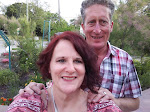 I began special education teacher training in 1982. I chose EI and CI because I wanted to teach autistic children. ASD (autism spectrum disorder as it's now called) wasn't an endorsement of its own yet.
I began special education teacher training in 1982. I chose EI and CI because I wanted to teach autistic children. ASD (autism spectrum disorder as it's now called) wasn't an endorsement of its own yet.Working with autistic children, I realized that as a child, I showed symptoms of mild autism. Let me clarify: children exhibit some autistic behavior as a normal part of development. It is the combination, severity and perseverance into older childhood, that marks a child autistic.
Two of the most unnerving, to those not familiar with autism, are rocking and head banging. I did both of those and it freaked some people out. If less was known about autism when I was in college, it was virtually unheard of in the 1960s.
Let me try to explain what I remember of how I felt when I rocked and banged my head. Maybe this will help you get inside the head of your autistic child or student.
Rocking, bouncing and swinging motions soothe infants and lull them to sleep. Persons with autism need that sensory stimulation in older years, sometime throughout their lives. It's thought that these help autistic people "integrate" (organize, control) their sensory perceptions. This makes sense, especially if the child has auditory, vision or perceptual problems, dyslexia, balance issues, allergies, sinus or ear trouble that affect the Eustachian tubes (vestibular balance center).
I had all of those, plus sleep apnea. Many didn't get diagnosed till adulthood. So my self attempted to fix them in the only ways it knew. I'd rock endlessly in my little rocking chair. I'd bang my head and face against my pillow to get to sleep. In the car, I'd bounce my head against the seat. It was an automatic respose, done to sooth, not hurt.
At 10, I still banged (bounced) my head at night to settle racing thoughts. If I was unable to, I felt disoriented, dizzy, tense, crabby. I couldn't sleep. I believe that's why autistic children resort to dangerous self-stimulation: picking skin, pulling out hair. I remember it felt like an itch I couldn't scratch if I couldn't rock or bang my head. They seemed to reconnect loose wires and neurological gaps for me.
One of my sons exhibited head banging or bouncing behaviors. Even as a very small baby he'd bounce his head as he fell asleep. This pattern developed as soon as he was able to hold his head and neck erect. He never cried and was happy and placid. Like me, he didn't head bang when upset. Just sleepy. He'd do it wherever he was, car, couch, on someone's lap.
If you have a non-hurtful headbanger, like my son and I, my advice is to let it happen. So long as he's not hurting himself, he may just be self-soothing. Make sure baby has a firm but soft mattress and child, a pillow so they don't hurt themselves. I believe that correctomg non-hurtful rocking and head banging, may cause latent, more dangerous forms. Thwarted, children may head bang less-safe places.
If she continues as she gets older, tactfully remind her to do it the privacy of her home, so others don't ridicule. Sadly, though our society accepts inappropriate self-soothing, smoking and drinking, natural forms upset us.
My family never shamed me. They accepted it and trusted I'd outgrow it when I was ready. That's how we dealt with our son's head bangingwww.healthhelp4u.blogspot.com.
. He outgrew it and so did I. For more on autism spectrum disorder (ADS) and autistic behavior, follow this blog and



